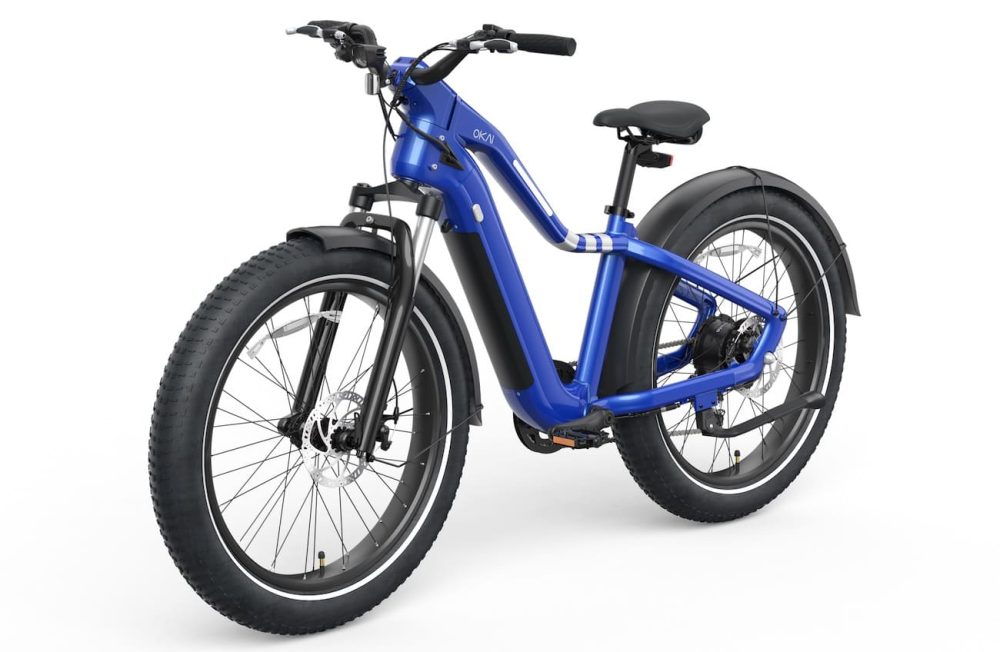As if we needed any more evidence proving how tech-integrated the latest generation of e-bikes are, look no further than the OKAI EB50. The company has just released an over-the-air (OTA) update that lets users significantly increase the top speed limit of the bike.
Originally launched earlier this summer as the OKAI Ranger, the 1,000W fat tire OKAI EB50 electric bike arrived with a rather mundane top speed of 20 mph (32 km/h).
That kept the bike legally designated as a Class 2 e-bike in the US, meaning it had a throttle-operated top speed of no more than 20 mph, and could masquerade its 1,000W motor as a 750W continuous-rated motor to comply with the Class 2 e-bike limits.
But a recently released update to the OKAI smartphone app that pairs with the bike has given owners more than just a fancy new skin or rounder icons. This time the update came with serious performance increases.
The app provides the option to unlock the top speed to a higher 28 mph (45 km/h).
Interestingly though, OKAI itself has confirmed that users are actually seeing speeds as high as 31 mph (50 km/h) with a fully charged battery. Unlike many larger electric vehicles that regulate their voltage for smoother performance, most e-bikes power their motor controllers and thus motors directly from their pack voltage. That means higher motor RPMs are available at higher states of charge, with an e-bike’s top speed then slowly tapering down as the battery discharges.
The new update also appears to unlock that new high speed on throttle-only operation, meaning that riders don’t need to pedal as well to engage speeds above 20 mph. Generally speaking, Class 3 e-bikes require pedal assist to engage motor power between 20-28 mph. An e-bike that can hit the Class 3 top speed limit of 28 mph but on throttle-only isn’t technically considered Class 3 eligible anymore.
This could have regulatory implications that see the $1,999 OKAI EB50 e-bike falling outside of the three designated e-bike classes that are adopted in much of the US. In practice, most police departments don’t yet understand the nuance of e-bike classes and thus aren’t out there patrolling for e-bikes that look like they’re going slightly over 20 mph without pedaling.
Even so, slipping outside of designated e-bike regulations is a dangerous game to play, as it could subject such e-bikes to motor vehicles laws that the three class e-bike system is designed to exempt them from.

The OKAI EB50 electric bike’s extensive app — complete with OTA updates to adjust the bike’s performance — isn’t the only tech-centric feature on the bike. The EB50 also comes with an NFC-enabled key card to give riders a secure way to lock and unlock the e-bike, though the app can also be used to unlock the e-bike over Bluetooth to avoid carrying a key card.
Many e-bike companies are doubling down on feature-rich apps and other tech-focused features as a way to differentiate their products from competitors. This is especially true of companies that rely largely on OEM components that are found on dozens of other e-bike models. Hardware innovations are often much more expensive and labor intensive to innovate, but software innovations may only require a few computer science interns and bargain basement wages.
Could OKAI’s move be a sign of what’s to come in the industry? Will there be more common performance unlocks available as simple and easy downloads? Or will e-bike companies go the way of Zero Motorcycles and offer upgrades as downloadable content to be purchased in the future? Let’s hear your thoughts in the comments section below.
.
Read the full article here



